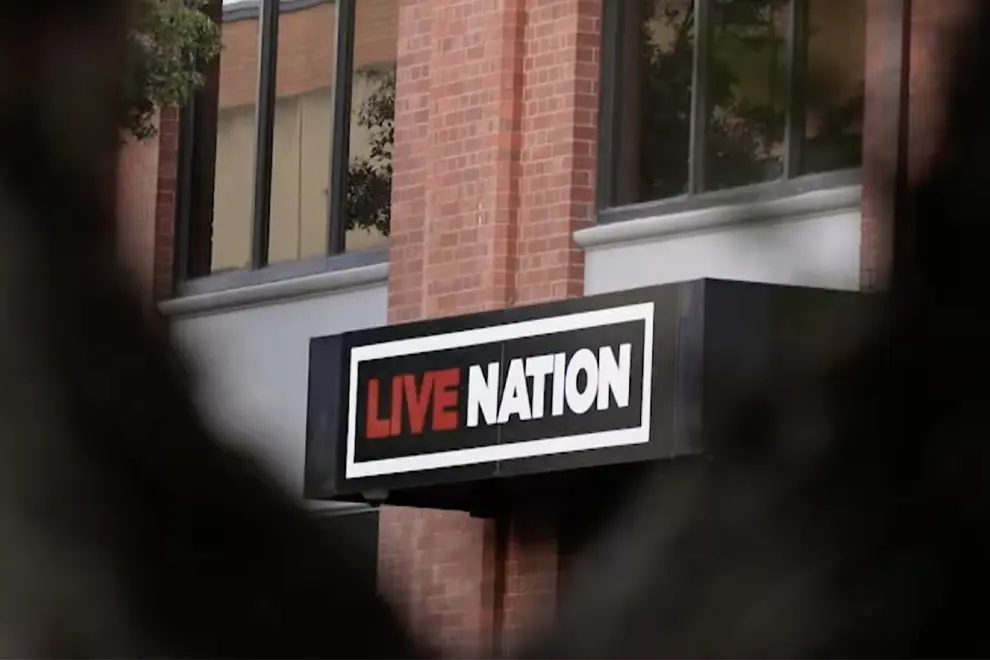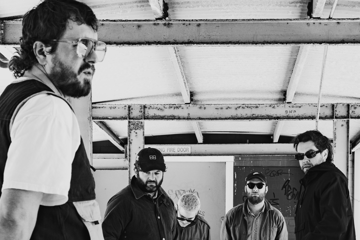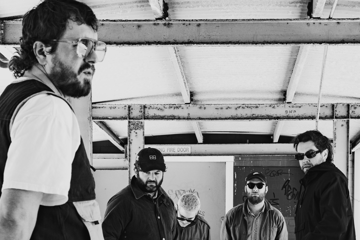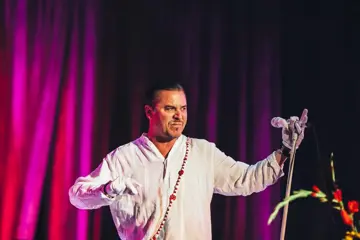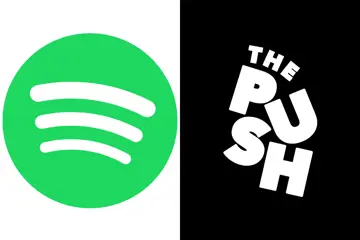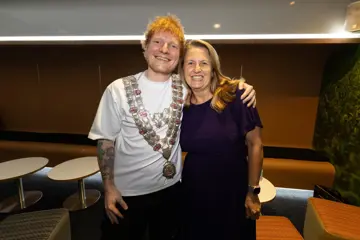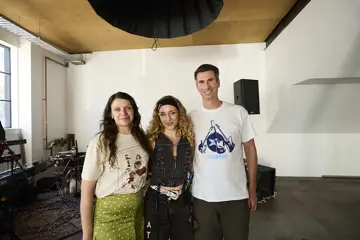 Bad//Dreems
Bad//DreemsOn Monday, October 14th, the ABC’s Four Corners program broadcast their highly anticipated report on the Australian live music industry, shining a spotlight on entertainment giant Live Nation.
The report, titled Music For Sale, did not hold back in its claims that the company engages in controversial practices, including the use of vertical integration, hidden fees, and more.
Throughout the program – which included interviews with artists such as Midnight Oil’s Peter Garrett, Bad//Dreems, and Barkaa – reporter Avani Dias took a look at the Australian music industry and impact that such practices have upon artists, venues, and ultimately, the fans.
However, the program was not well-received by Live Nation itself, who issued a statement ahead of its broadcast to label the report “inaccurate and unbalanced”.
Don't miss a beat with our FREE daily newsletter
“Australia’s live entertainment industry is highly competitive,” Live Nation explained via their statement. “We are one of many promoters, with TEG and Frontier among the top. Our investments in artists, venues, and events have enriched Australia’s cultural landscape, creating thousands of jobs.”
Regardless, the opinions in the broadcast placed blame upon Live Nation. Michael Chugg of rival promoters Frontier Touring was blunt in his appraisal of Live Nation. “[They] f***ed it up, basically, they pay too much for acts,” he said. “It's all about their share price."
Likewise, Bad//Dreems’ Alex Cameron noted a lack of profits from their 2023 album tour, largely due to Live Nation’s vertical integration and the fact that their vested interest in so many aspects of the live music scene resulted in only about $9,000 of the $100,000 box office takings coming back to the band.
"We were paying 10 per cent to our [Live Nation-owned] booking agent, there were ticketing fees, then the venue fees to Live Nation-owned venues, and then those Live Nation-owned venues were also taking a merch cut of the merch we sold," he explained.
"We were paying four times to Live Nation, and we had no way of negotiating that, and in fact, when we raised it with our booking agent, they just [gave us] the shoulder shrug. A few thousand dollars of merch fees is a pittance to Live Nation. It's a huge amount of money for a band like us."
Speaking to The Music following the broadcast, Dias explains that going into the reporting of the story, dozens of people from both Australia and abroad were interviewed for the piece, though many were reluctant to go on the record for fear of any potential retribution.
“A lot of people were really hesitant; a lot of people told us they had concerns about the company but did not want to speak publicly,” Dias said. “It wasn't just people who are front-facing artists; it was people who work behind the scenes who also said, ‘We have concerns about this company, but it's just too difficult and too risky for me to talk about this company because of the repercussions this could have on our business or our careers.’
“That was the feeling among most people we spoke to, but once a few people decided to put themselves forward, there was sort of a domino effect where more and more people decided to rally and talk about their feelings and experiences,” she adds.
“People were concerned that they might not get booked for future gigs or they might not get business with the company because Live Nation has a finger in so many different pies of their live music industry.”
As the program points out though, the issues faced by the Australian music industry aren’t solely focused on Live Nation, rather, it’s their vertical integration that has seen them have a wide-reaching impact.
TEG and AEG/Mushroom were also cited as key industry players, though they did not receive the same focus in the broadcast.
“There are two other major live music businesses in Australia, but the difference with Live Nation is that it is the only one to have a finger in each part of the supply chain of the live music process,” Dias adds. “There's obviously TEG, which is probably the closest to Live Nation in terms of a company and having that vertically integrated model.
“It obviously owns festivals, it owns Ticketek, it has a venue or maybe a couple, but the difference, for example, with Live Nation is that it has a stake in merchandising, in booking agencies, and so on,” she adds. “It's really that kind of ‘finger in every pie’, that kind of process that people across the industry really had concerns about, which is why Live Nation became a bigger focus.”
However, while TEG and AEG/Mushroom could feel as though they’ve been let off the hook in terms of bearing the brunt of the spotlight, Dias notes that the others weren’t absolved of responsibility completely.
At one point, Michael Chugg was asked about his own experiences in the live industry and whether he and late Mushroom Group Founder Michael Gudinski were in a similar position of power before Live Nation’s entrance into Australia in 2010.
"I suppose so,” Chugg admitted. “We didn't abuse it though.”
“We didn't want to just let them off the hook,” Dias explains. “But the reason why we focused on Live Nation specifically is because of that supply chain ownership here in Australia, but also because globally, Live Nation's profits far outweigh the other companies.
“Frontier's obviously owned by AEG, another global operator; TEG also has ownership overseas as well, so the fact that Live Nation's profits are – just in order of magnitude – much further ahead of the other companies globally [was one reason for the focus].”
Of course, the prevalence of vertical integration is not a topic solely used by the music industry. Other industries also use such practices to further their own interests. In music, however, the impact is one that leaves artists vulnerable to underpayment or unable to navigate an industry that already preys upon inexperience and naivete.
However, while artists find it difficult to navigate the financial and contractual side, Dias notes that the biggest necessity raised by those interviewed for the Four Corners report was government regulation to benefit both artists and consumers.
“I think Peter Garrett said it best [when he noted] there's a reason why there's anti-competitive laws in Australia, there's a reason why monopolies are criticised, whether it's petrol companies or grocery stores,” Dias said.
“There are obviously different concerns, and it's arguable how many people it affects in each industry, but the reason people were so concerned in the music industry is because of the effect, which we can see in the live music industry in Australia – especially on the grassroots end.”
One voice featured in the report was Minister for the Arts Tony Burke, who was asked directly about the notion of dynamic pricing. For those unaware, dynamic pricing was the controversial technique utilised on the likes of Oasis’ UK reunion tour, which saw countless fans charged exorbitantly due to altered prices based on demand.
Burke, however, said that it was not something the government was looking into at the current time. "Surge pricing is something that, as consumers, people have always dealt with, I don't love it, but I think we have to be realistic, it's always been there,” he explained.
Dias explained that everyone interviewed for the report unanimously agreed that government regulation was needed, pointing to Barkaa’s quote that it’s a “cowboy industry” with little to no regulation.
“This story isn't about kicking Live Nation out of the country; no one [has] said that that should happen,” Dias says. “Everyone said they are free to operate here however they want, but governments should step in to make sure that there is more of an even playing field in terms of dynamic pricing.
“A lot of consumers are really concerned about that and what we have seen in countries like the UK after the Oasis tour,” she says. “Governments in Europe are actually investigating dynamic pricing, whether it's been transparently rolled out to consumers, and so on.”
The result is the prevailing hope that the Australian government will step in and do the same, much like in the US, where Ticketmaster and Live Nation have been sued by the government over claims that it is running a “monopoly” that has pushed out smaller competition and driven up consumer prices.
“[We spoke to] people like Peter Garrett, who have had direct knowledge and worked extensively in the US, the drummer of Camp Cope, Thommo [Sarah Thompson], and several artists, they all told us when they try to make it overseas, they go to the US, and they find they have no choice at all, but to play at Live Nation venues,” Dias notes.
“Obviously, we're not at that stage here in Australia, but the concern among several people was they didn't want us to get to that stage,” she adds. “They were calling for things to be regulated and to stop it in their tracks.”
Live Nation’s response to the Four Corners piece has been well-documented, with the company noting that they disagree with the majority of claims being presented in the report. Likewise, they addressed the likes of dynamic pricing, refuted claims of a negative impact on local talent, and noted they answered questions raised by Four Corners only to be largely ignored in favour of a narrative that was more sensational.
Dias stated that Live Nation's media team were contacted, requests for interviews were made, with the company declining all requests and instead responding via legal letters of complaint. Dias adds that 35 detailed questions were sent to Live Nation, to which only 15 received responses.
However, if Live Nation are indeed acting in good faith, does that not raise further questions about the state of the Australian music industry?
“Live Nation says it's acting in good faith; it says that it is supporting the Australian industry, championing local talent, and developing artists,” Dias notes. “What concerned people from the industry, both here and overseas, have told us is that when you have a model, which is servicing the profits of your shareholders, it is difficult to support development of new artists and not see music and live music as purely a profit-driven venture.
“That's the concern among people, that the sheer corporate structure of how Live Nation exists feeds into it,” she adds. “Obviously Live Nation disputes that and says that it is supporting the local industry, so all we are doing is listening to what people in the industry have told us and relaying those concerns.”
For Dias and the likes of Four Corners, who have now shared the story with the world and prompted myriad conversations about Live Nation and the wider ticketing industry, the question that remains is in regard to what can be done. But when it comes to what can be done to make ticketing more transparent, the answer will never be an easy one.
“I think that the big push was for ticketing to be regulated,” Dias says. “Live Nation, Ticketek, Ticketmaster; the companies aren't breaking the rules or breaking any laws by hiding fees within the price of a ticket and not being transparent with customers.
“The ACCC, the consumer watchdog, told us the same thing, and Live Nation said the same thing. So what the push is across the board from people in the industry, as well as fans, is for this to be regulated so there is more transparency for consumers about where their money is going and why they are paying so much in concert fees. That push is ongoing, and it's really now up to the government to see if it wants to act.
“For these companies, ticketing is the way that they make money,” she adds. “It is the big profit driver in many ways for these companies. The push here is to make sure that it is regulated to support consumers and to ensure that the best artists in Australia are then supported through fans.”

